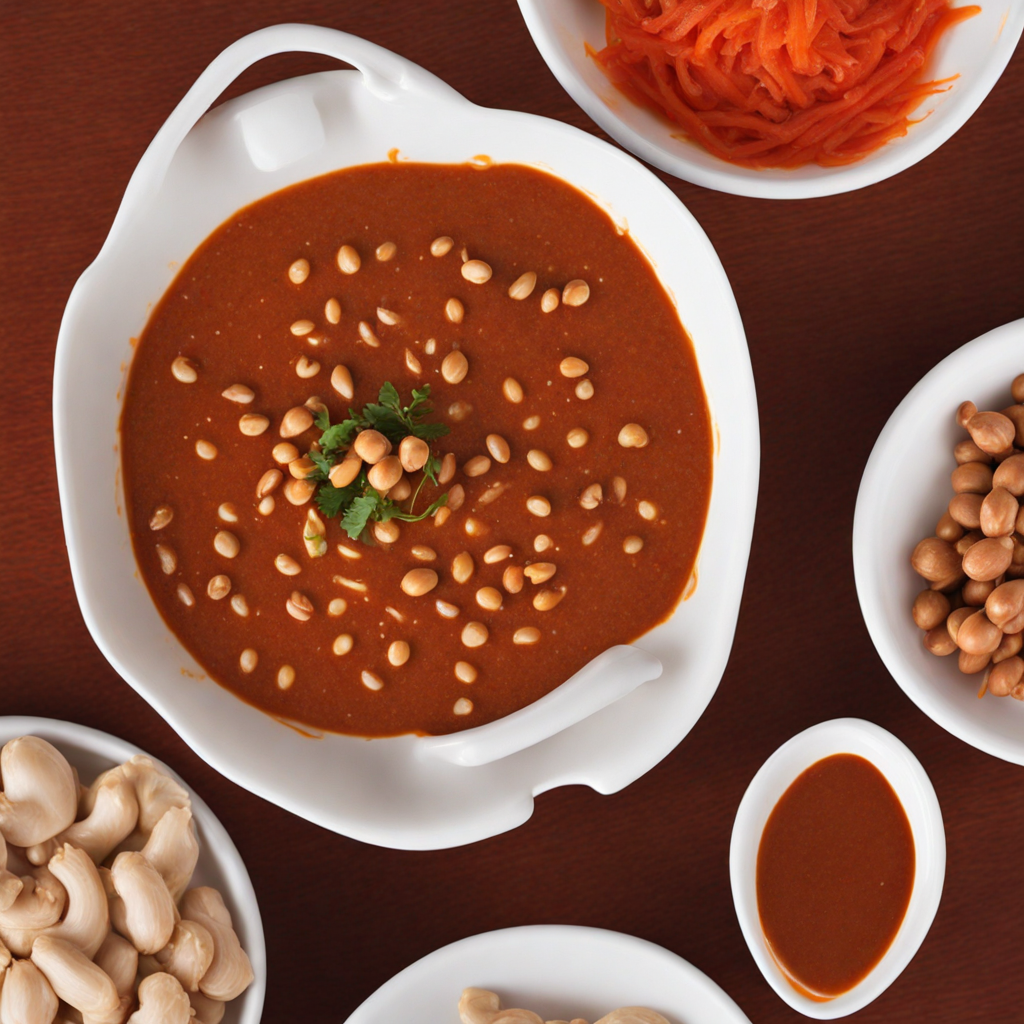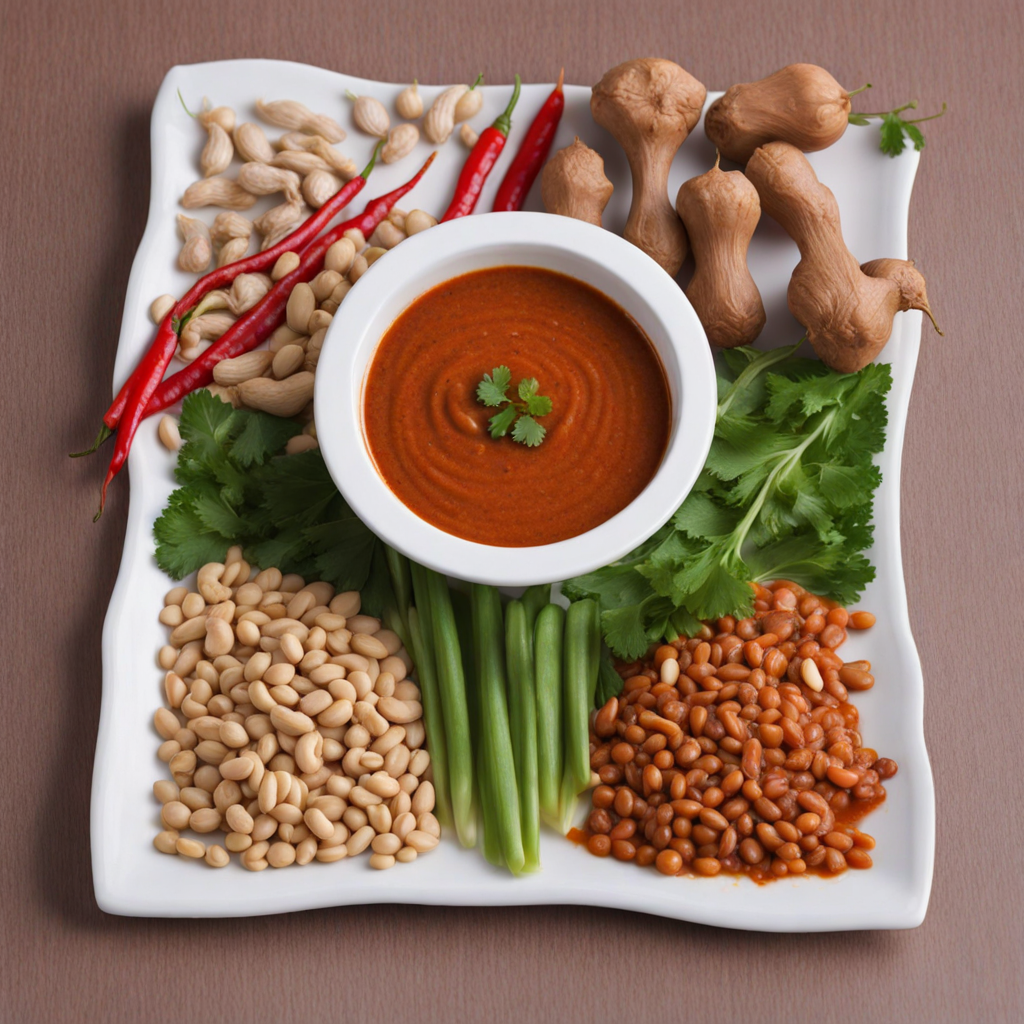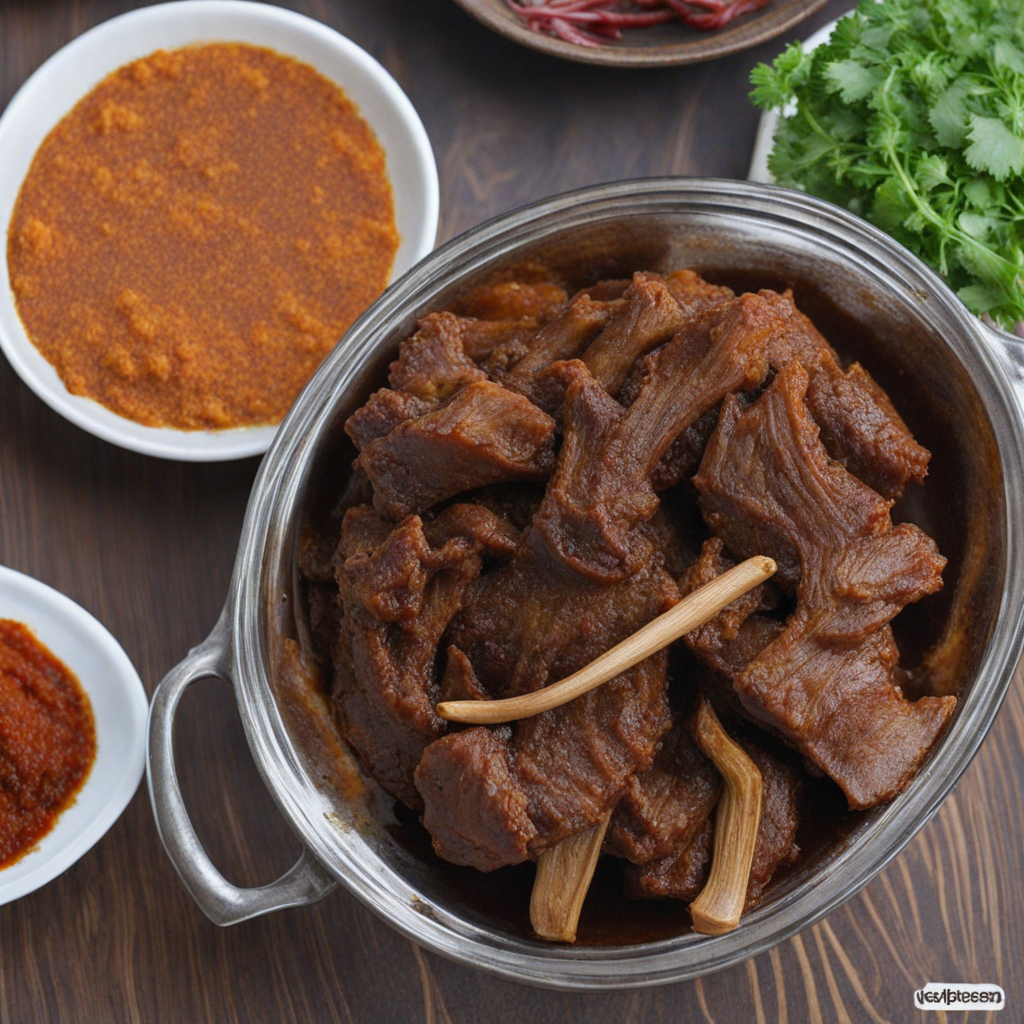Spicy Peanut Sauce
Spicy Peanut Sauce, a beloved staple in Nigerien cuisine, is a rich and flavorful blend that captivates the palate with its unique combination of ingredients. At its core, this sauce features ground peanuts or peanut butter, which lends a creamy texture and a nutty depth. The sauce is typically infused with an array of spices, including chili peppers, garlic, ginger, and sometimes tamarind, creating a delightful heat that balances perfectly with the natural sweetness of the peanuts. This balance of flavors makes it not only versatile but also an essential component in many dishes. The preparation of Spicy Peanut Sauce often involves sautéing the spices to release their essential oils, followed by the addition of the peanut base. This method enhances the overall flavor profile, making each bite a harmonious blend of creaminess and spice. The sauce can be adjusted to taste, allowing for varying levels of heat, which makes it appealing to a wide range of preferences. It's commonly served over grilled meats, in vegetable stews, or as a dip for fresh produce, making it a perfect companion for both casual meals and festive gatherings. Beyond its delicious taste, Spicy Peanut Sauce also embodies the rich culinary traditions of Niger. It reflects the country's agricultural bounty, particularly the prevalence of peanuts as a significant crop. This sauce not only showcases the cultural importance of peanuts in Nigerien diets but also highlights the creativity of local cooks who elevate simple ingredients into extraordinary flavors. For those looking to explore new culinary horizons, Spicy Peanut Sauce offers a delightful adventure that is both satisfying and deeply rooted in the vibrant food culture of Niger.
How It Became This Dish
The History of Sauce d’Arachide: A Culinary Treasure from Niger Origins and Ingredients Sauce d’Arachide, or peanut sauce, is a beloved dish originating from the West African nation of Niger. Its primary ingredient, the peanut (Arachis hypogaea), is not native to Africa but rather has its roots in South America, where it has been cultivated for thousands of years. The introduction of peanuts to Africa is believed to have occurred in the 16th century, brought by Portuguese traders or through the transatlantic slave trade. The legume quickly adapted to the African climate and became a staple ingredient across the continent, especially in the Sahel region, which includes Niger. The fundamental components of Sauce d’Arachide are simple yet nourishing: ground peanuts, typically mixed with water to create a creamy paste, serve as the base. The sauce is often enhanced with various vegetables, spices, and sometimes meat, making it a versatile and flavorful accompaniment to rice, millet, or couscous. Common ingredients include tomatoes, onions, and sometimes leafy greens like spinach or amaranth, which contribute to the dish's rich nutritional profile and vibrant taste. Cultural Significance In Niger, Sauce d’Arachide transcends mere sustenance; it embodies a cultural identity. Food in Niger is deeply intertwined with social practices, celebrations, and communal gatherings. The preparation and sharing of Sauce d’Arachide often occur during significant life events such as weddings, naming ceremonies, and religious festivals, acting as a symbol of hospitality and generosity. It is common for families to prepare large quantities of this sauce to feed extended family and friends, reinforcing bonds within communities. In Nigerien culture, food is not only about nourishment but also about storytelling and tradition. The recipe for Sauce d’Arachide can vary from family to family and region to region, with each iteration reflecting local ingredients, culinary practices, and personal preferences. This adaptability highlights the ingenuity of Nigerien cooks, who skillfully incorporate seasonal vegetables and spices into the sauce, ensuring that it remains a dynamic and evolving dish. Historical Development Historically, the use of ground nuts in sauces can be traced back to ancient culinary practices in various African cultures. However, the form that Sauce d’Arachide takes today has been shaped significantly by the socio-economic and political landscape of Niger. The colonial period in the late 19th and early 20th centuries saw the introduction of new agricultural practices and crops, which influenced local cuisine. While peanuts thrived in the region, their cultivation became more organized, leading to increased production and incorporation into daily meals. During the mid-20th century, as Niger gained independence from French colonial rule, there was a resurgence of interest in traditional foods as expressions of national identity. Sauce d’Arachide emerged as a symbol of this culinary renaissance, celebrated for its simplicity and the way it represents the agricultural bounty of the region. This period also marked increased awareness of nutritional needs, as peanut sauce became recognized for its high protein and healthy fat content, making it an essential dish in combating malnutrition. In contemporary Niger, Sauce d’Arachide continues to hold a cherished place on the dining table. It is often featured in local markets, where vendors sell freshly prepared sauces alongside other traditional dishes. The dish has also gained recognition beyond national borders, with Nigerien diaspora communities introducing Sauce d’Arachide to new audiences around the world, further solidifying its status as a culinary ambassador of Niger. Modern Adaptations and Global Influence In recent years, Sauce d’Arachide has seen various adaptations as it intersects with global culinary trends. Chefs in urban centers have begun to experiment with the sauce, infusing it with international flavors or utilizing it in fusion dishes. For example, some have paired it with grilled or roasted meats, while others have incorporated it into pasta dishes or wraps, showcasing its versatility and appeal to younger generations. Moreover, the health food movement has elevated the status of peanut-based products, with an increasing appreciation for their nutritional benefits. Sauce d’Arachide, with its blend of fats, proteins, and vitamins, has found a place in health-conscious diets, often recommended for its ability to provide sustained energy and essential nutrients. Despite these modern influences, the essence of Sauce d’Arachide remains rooted in its traditional preparation and communal significance. Many Nigeriens still prefer to prepare the sauce from scratch, often grinding the peanuts by hand using a mortar and pestle, a practice that connects them to their ancestors. This traditional method not only preserves the authentic flavor but also fosters a sense of pride and connection to cultural heritage. Conclusion Sauce d’Arachide stands as more than just a dish in Niger; it is a testament to the resilience and creativity of its people. From its origins as a humble ingredient introduced from afar to its current status as a symbol of national identity and communal sharing, Sauce d’Arachide embodies the rich tapestry of Nigerien culture. It serves as a reminder of the ways in which food can narrate history, foster connections, and celebrate the bounty of the land. As the world becomes increasingly interconnected, the story of Sauce d’Arachide offers a glimpse into how traditional foods can evolve while retaining their cultural significance. Whether enjoyed in a bustling market in Niamey or at a family gathering, Sauce d’Arachide continues to nourish both body and soul, bridging generations and preserving the culinary heritage of Niger for future generations to savor.
You may like
Discover local flavors from Niger







